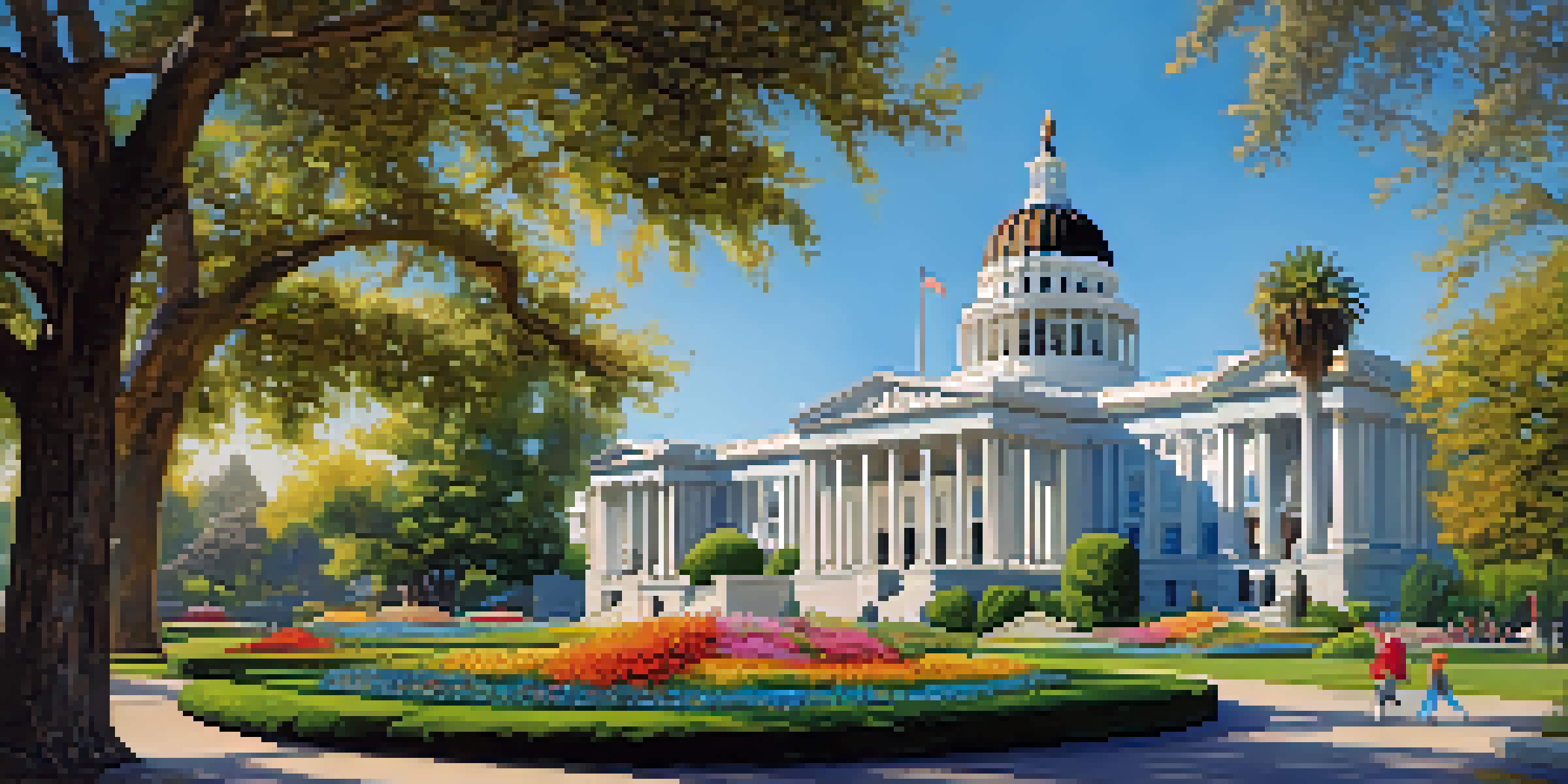The Significance of Sacramento as the State Capital

A Brief History of Sacramento's Capital Designation
Sacramento became California's state capital in 1854, chosen for its strategic location and accessibility. The Gold Rush era played a significant role in this decision, as Sacramento was a bustling hub for miners and merchants. The city’s growth was rapid, and it became a center for government and trade, establishing its importance early on.
The past cannot be changed. The future is yet in your power.
Before Sacramento, various cities held the title of capital, including San Jose and Vallejo. However, Sacramento's location along the Sacramento River made it a more viable option for transportation and commerce. The decision to designate Sacramento as the capital was a turning point in the city’s history, setting the stage for its future development.
Today, the history of Sacramento as the capital is celebrated through various historical landmarks and museums. Visitors can explore the State Capitol building, which reflects the city’s rich past and ongoing political significance. This historical context adds depth to Sacramento’s identity as the heart of California's government.
Sacramento's Role in California's Government
As the state capital, Sacramento houses the California State Legislature and the Governor's office. This central role makes it a vital location for political activity and decision-making in the state. The activities that take place within the Capitol building influence policies that affect millions of Californians.

The city is also home to numerous state agencies and departments, further solidifying its status as a political hub. These agencies work on various issues, from environmental regulations to public safety, ensuring that the government functions effectively. This concentration of political activity contributes to Sacramento's vibrancy, with events and discussions shaping the state's future.
Sacramento's Historic Capital Role
Sacramento became California's state capital in 1854, chosen for its strategic location during the Gold Rush, which set the stage for its growth and significance.
Moreover, Sacramento's status as a capital attracts visitors for political tourism. Many come to witness the legislative process firsthand, attend public meetings, or engage in civic activities. This engagement fosters a sense of community and encourages residents to be active participants in their government.
Cultural Significance of Sacramento
Sacramento is not just a political center; it's also a melting pot of cultures and traditions. The city hosts numerous cultural events throughout the year, celebrating its diverse population. For instance, the California State Fair showcases local arts, crafts, and cuisine, reflecting the state's rich cultural tapestry.
History is not a burden on the memory but an illumination of the soul.
Moreover, Sacramento's historic districts, like Old Sacramento, offer a glimpse into the past with preserved buildings and museums. These sites tell the story of the city’s development and its role in California’s history. Visitors can stroll along the riverfront, experiencing the blend of history and modernity.
In addition to its events and historic sites, Sacramento is home to a thriving arts scene. From galleries to theaters, the city fosters artistic expression that resonates with its residents. This cultural vibrancy enhances the quality of life in Sacramento and reinforces its significance as a capital city.
Economic Impact of Sacramento as the Capital
The designation of Sacramento as the state capital has significantly influenced its economy. The presence of state government offices provides jobs and stimulates local businesses. Restaurants, shops, and services thrive on the daily influx of government employees and visitors.
Moreover, Sacramento’s economy benefits from hosting numerous events and conferences related to politics and governance. These gatherings attract professionals from around the state and beyond, contributing to the local economy. This economic activity fosters growth and innovation within the city.
Cultural Diversity and Vibrancy
The city is a melting pot of cultures, showcasing its diversity through events like the California State Fair and a thriving arts scene that enriches community life.
As the capital of California, Sacramento also attracts investments and development projects. Investors are drawn to the city for its political stability and economic potential. This dynamic environment creates opportunities for entrepreneurs and contributes to the overall prosperity of the region.
Education and Research in Sacramento
Sacramento is home to several prominent educational institutions, including California State University, Sacramento. These institutions play a crucial role in shaping the workforce and driving research in the region. Students and researchers contribute to the city’s innovation and development.
The proximity to state government also provides unique opportunities for students in public policy and political science. Internships and partnerships with government agencies allow students to gain real-world experience and contribute to meaningful projects. This synergy between education and government enhances the city’s profile as a hub for learning.
Furthermore, Sacramento's focus on education fosters a culture of civic engagement. Residents are encouraged to participate in local governance and community initiatives. This emphasis on education not only benefits individuals but also strengthens the community as a whole.
Sacramento's Natural Beauty and Recreational Opportunities
In addition to its political and cultural significance, Sacramento boasts stunning natural beauty. The city is situated at the confluence of the Sacramento and American Rivers, providing ample opportunities for outdoor activities. Residents and visitors enjoy kayaking, cycling, and walking along the scenic riverfront.
Parks and green spaces, such as William Land Park and the Sacramento Zoo, offer recreational options for families and nature enthusiasts. These areas contribute to a high quality of life, allowing residents to connect with nature without leaving the city. The balance of urban and natural environments makes Sacramento an attractive place to live.
Economic Growth from Capital Status
Sacramento's designation as the state capital has boosted its economy by providing jobs, attracting investments, and hosting events that draw visitors and professionals to the area.
Moreover, Sacramento's climate is conducive to year-round outdoor activities, with warm summers and mild winters. This pleasant weather encourages a lifestyle that embraces outdoor living, further enhancing the city's appeal. The natural beauty of Sacramento complements its role as a state capital, making it a unique place to live and visit.
Future Prospects for Sacramento as a State Capital
Looking ahead, Sacramento's role as California's state capital is poised for continued growth and evolution. The city is embracing technological advancements and sustainable practices, positioning itself as a leader in innovation. This forward-thinking approach will likely attract new residents and businesses, further enhancing its significance.
Additionally, ongoing urban development projects aim to revitalize neighborhoods and improve infrastructure. These initiatives will not only enhance the quality of life for residents but also solidify Sacramento's status as a vibrant capital. The city's commitment to progress reflects its adaptability and resilience.

Ultimately, Sacramento's future as a state capital depends on its ability to balance growth with its rich history and cultural heritage. By fostering a community that values both tradition and innovation, Sacramento can continue to thrive as an essential part of California’s identity.